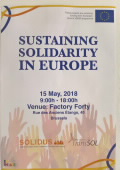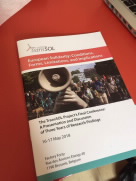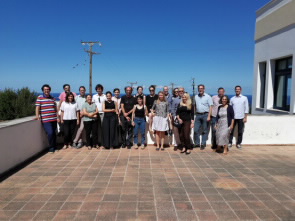Difference between revisions of "Main Page"
(→How should transnational activism be organised?) |
(→How can cooperation and momentum be generated between organisations and their activists?) |
||
| Line 14: | Line 14: | ||
[[How should transnational activism be organised?]] | [[How should transnational activism be organised?]] | ||
| − | + | [[How can cooperation and momentum be generated between organisations and their activists?]] | |
| − | |||
| − | |||
| − | |||
| − | |||
| − | |||
| − | |||
= How can cooperation and momentum be generated between civil society and state actors? = | = How can cooperation and momentum be generated between civil society and state actors? = | ||
Revision as of 17:39, 30 May 2018
Contents
Welcome to the TransSOL-Wiki on Good Practices!
TransSOL is an EU-funded research project dedicated to describing and analysing solidarity initiatives and practices at a time in which Europe’s existence is challenged by the consequences of the 2008 economic and financial crisis, by the problematic management of large fluxes of refugees and by the outcome of the 2017 Brexit referendum.
The TransSOL Project, and in particular the transnational civil society organisation European Alternatives, researched the goals, platforms, organisation, effectiveness and challenges faced by three networks that have been able to facilitate solidarity across European nations.
These organisations have a lot to teach us on what works for getting people together at a grass-roots level, and for cooperating with shared aims having to do with migration, disability and employment
Who are these organisations? What do they do?
Why are these organisations effective at promoting European solidarity?
How should transnational activism be organised?
How can cooperation and momentum be generated between organisations and their activists?
How can cooperation and momentum be generated between civil society and state actors?
What becomes clear through analysing the Cities of Solidarity is that there must be a structural reform of the European and national regulatory framework, which foresees a modification of the current international Conventions on the right of asylum and a more supportive migration policy, sharing responsibilities and burdens on a transnational level. The European Commission and European Council should give political and financial recognition of the role of cities, and local authorities should have of the broadest political and financial autonomy in migration matters granted to single national governments. The construction of stable and developed transnational networks between cities is necessary, which provides for the strengthening of exchanges of good practices and models of reception and social inclusion, the possibility of negotiating with one voice in front of the European institutions and national governments and the possibility of developing autonomous city-to-city policies, bypassing the direct control of the nation-state.
The full report can be found at www.transsol.eu[1]
Recent Events
Sustaining Solidarity in Europe
In collaboration with SOLIDUS, the TransSOL team hosted Sustaining Solidarity in Europe on 15 May 2018 in Brussels at the Factory Forty venue. The public event brought together social scientists, NGO/CSO representatives and members of the public in order to collectively address the factors that promote or discourage transnational colloaboration across European countries.
Discussion began at 9am and ended at 6pm, and TransSOL researchers Christian Lahusen, Simone Baglioni and Maria Kousis made important contributions to the public dialogue.
European Solidary: Conditions, Forms, Limitations and Implications
The TransSOL Project held its final event on 16-17 May 2018 in Brussels at the Factory Forty venue. The conference, which included TransSOL researchers and guests, featured a presentation and discussion of the past three years of research findings.
Guest keynote speakers included Gian-Andrea Monsch (University of Lausanne), Caroline de la Porte (Copenhagen Business School) and Maria Petmesidou (Democritus University). In addition to TransSOL topics such as civil society, public opinion and public discourses on solidarity, participants also had the chance to discuss the concept of the common good, welfare reform and austerity and the implications of neoliberalism for public policy.
About TransSOL
TransSOL is an EU-funded research project dedicated to describing and analysing solidarity initiatives and practices at a time in which Europe’s existence is challenged by the consequences of the 2008 economic and financial crisis, by the problematic management of large fluxes of refugees and by the outcome of the 2017 Brexit referendum. In particular, TransSOL focuses on three areas of vulnerability: migration, unemployment and disability.
Consortium
European Alternatives[2] https://vimeo.com/269581909
Glasgow Caledonian University Yunus Centre for Social Business and Health
University of Copenhagen Department of Media, Cognition and Communication
University of Crete Department of Sociology
University of Florence Department of Legal Sciences
University of Geneva Institute of Citizenship Studies
University of Sheffield
Department of Politics
University of Siegen Centre for Research in the Social Sciences
University of Warsaw Institute of Social Policy
Sciences Po Paris Centre for Political Research
Web
www.transsol.eu[3] Twitter: @TransSOLproject[4] Facebook: TransSOLproject[5]
Best Practices
1 Inner organization: How should transnational activism be organised?
3 How can cooperation and momentum be generated between civil society and state actors?
4 Good Practices: A Public Forum
5 What motivates people to engage in transnational solidarity?


